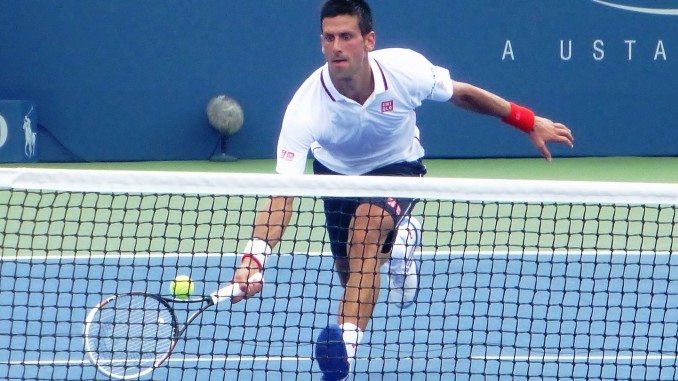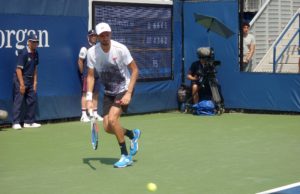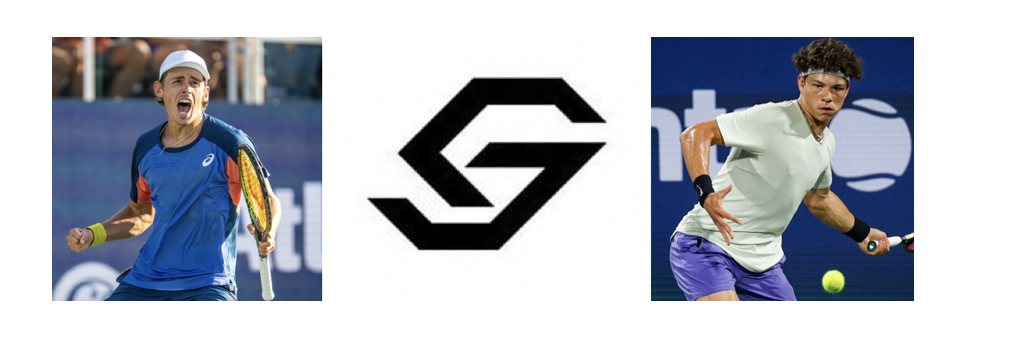
There is much to admire about the way Daniil Medvedev came back from a set down to defeat Novak Djokovic in Saturday’s second semifinal match at the Western & Southern Open. First is the fact that Djokovic is the greatest front-runner in the history of the men’s game. EVER. Seriously. The ATP wrote a really interesting article at the end of 2018 in which they revealed that Djokovic, Rafael Nadal, and the Bjorn Borg own the highest percentage of matches won after winning the first set. Djokovic’s win-rate is 95.9 percent (Nadal’s is 94.8 percent). Which basically means that Medvedev accomplished something only four percent of other players were able to do.
But perhaps more fascinating than that is the deliberate and precise way he went about it. Medvedev didn’t stumble into that win by happenstance. This wasn’t “I was just executing my game, and then…WOW! I beat Novak Djokovic!” His game, impressive as it has been over the past month, was going to get him the kind of beat down he suffered at the hands of Nadal in Montreal last week. He knew it. He knew Djokovic was making a three-course meal of every second serve he was forced to hit.
“I was standing there before my second serve” Medvedev said in his presser, “and I was, like, I’m losing literally. I don’t know the percentage I had, but in my opinion I had, like, 20% the second service won. Especially in the crucial moments he was pushing me. So I say, If I do one double fault it won’t change my life. Same result. But if I put it in, it’s maybe going to be an ace, and I actually made a good decision to do it like this.”
Certainly Medvedev took an unconventional approach. But it was more than that. It was a willful, mulish decision on his to break “the rules” as they pertain to serving against one of the greatest returners of all time. A Servers and Returners Guide to Conduct as Interpreted by Novak Djokovic if you will. It’s certainly true that Djokovic’s own prowess on the return was the driving force behind the decision. He quite literally had nothing to lose.
That he served first serves only for a set and a half might have been excusable, had he also donated a respectable number of double faults. He didn’t. He hit three double-faults in two sets of serving ridiculous, risky serves. In that same time, he smacked FIVE second serve aces. And even that might have been forgiven if he hadn’t won. He did.
Djokovic wasn’t surly in his post-match presser, yet he wasn’t quite able to hide his righteous indignation, either.
“When someone serves 128-miles-per-hour second serve and doesn’t make too many doubles faults and goes for every shot, I mean, you just have to put your hat down and congratulate him.” And when asked how Medvedev’s game has improved, he remarked, “I don’t think I can kind of say that he improved his second serve. You know, he was serving two first serves from one point of the match till the end of the match.”
It was as Roger Federer-like as I’ve ever heard Novak Djokovic sound. So much so that I’m grinning as I type this entry.
Go back, if you will, to the 2011 U.S. Open semifinal between Roger and Novak. Federer earned a pair of match points at 5-3 in the fifth set. On the first, he put in a good serve that Djokovic drilled for a return winner. Djokovic went on to win the match. Federer was positively incensed that Nole would go for such a risky shot at such a time, and his own indignation spilled out all over the press room in one of the most ungracious pressers Roger has ever given. Here’s an excerpt:
Q. When a guy hits a shot like that forehand on match point, is that a function of luck, of risk, or is it a function of confidence that someone would make kind of…
ROGER FEDERER: Confidence? Are you kidding me? I mean, please.
Look, some players grow up and play like that. I remember losing junior matches. Just being down 5-2 in the third, and they all just start slapping shots. It all goes in for some reason, because that’s the kind of way they grew up playing when they were down.
I never played that way. I believe in hard work’s gonna pay off kinda thing, because early on maybe I didn’t always work at my hardest. So for me, this is very hard to understand how can you play a shot like that on match point.
But, look, maybe he’s been doing it for 20 years, so for him it was very normal. You’ve got to ask him.
Djokovic was much more polite on Saturday night…but the sentiment is the same. You don’t DARE take a huge risk against a great champion and then have that risk pay off. That’s not how things are done.
Except maybe it is. Maybe once in a while, we need someone to stage a tennis coup and shake things up a little. Either way, you can be sure Nole won’t soon forget it.



I know it’s not the same, but when you write an article on how the ‘more than unconventional’ strategy of hitting two first serves got someone to win, I feel like Kyrgios deserves to be mentioned. He hit the second fastest second serve in tennis history this year.
I didn’t include Kyrgios, because I can never be sure if he does that because he’s trying to win or because he doesn’t give a crap. For me, that disqualifies him as a candidate for a legitimate mention in the discussion.
…I did consider it, though.
Nice article Cheryl. I am glad to see Medvedev play that way, without behaving like he’s already a star (Zverev, Tsitsipas) and with no fear or ‘too much respect’.
It’s good to see Djokovic’s team get a taste of their own medicine. I remember his analytics guy (who is also on the ATP payroll for some strange reason) was talking earlier this year about how he architected Dustin Brown’s strategy against Nadal at Wimbledon where he hit two first serves, etc. to win. Also, as you pointed out his hit and hope returns against Federer at USO.
The stakes were pretty low here for Djokovic though (winning or losing in Cincy will have no bearing on his favorite status at USO) and his response was pretty muted. The Nadal team by comparison is much more opinionated about what constitutes the most entertaining tennis and often is pretty negative about the hit every shot as hard as you can and hope for the best strategy.
At the end of the day, there is a very short list of players who can beat Djokovic at USO (Nadal, Fed, RBA, Kyrgios, maybe one or two more) and they need to be playing great with Djokovic having a down day. Hopefully one of them can do the business, because while I have tons of respect for Djokovic, I find most of his matches pretty uninspiring as a fan, unless he is actually getting pushed, which happens like 2-3 matches per year if we are lucky. Otherwise, they are pretty emotionless beatdown affairs that the outcome is never in doubt for.
Absolutely true that it had very little impact on Djokovic. The man is the current defending champion of 3 Slams…Thiem’s win at the French made a dent, no doubt…little else that’s happened this year would have done, I imagine.
Yet, it was still an interesting loss. It certainly meant more to Med than it did to Novak. But the fact that Daniil even tried it is something to note. That it worked is probably a fluke. 🙂
I think you are right on. It is a formula I could see working for a couple of other guys against a Djokovic or Nadal, but you have to be firing when you try it, or you will give away too many free points.
Interesting point. If Federer had played with that attitude on certain points, he might have closed out a few big matches he went on to lose.
Don’t think that will happen. Just not Fed’s style. But things can change…
Actually, it is Fed’s style on most points. It’s just that on the biggest points, for some reason, he becomes conservative. If he just played his usual game on all points including the biggest ones, he would have won many more big matches than he has, including Wimby this year.
Wimby 14, 19, and one USO at least. Well done, behaving like a doorman in his own hotel.